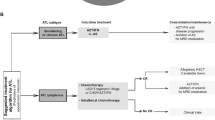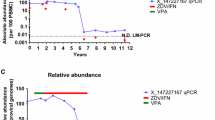Abstract
Adult T-cell leukemia/lymphoma (ATL) is the first human malignancy associated with a retroviral infection and occurs in approximately 5 % of the 15 million to 20 million people infected by human T-cell lymphotropic virus 1. In general, ATL is resistant to chemotherapy, and while awaiting new therapeutics, patients commonly face a detrimental progress of the disease and death. The viral oncoprotein Tax is a key player in the cause of ATL and acts by interfering with DNA repair, cell cycle, apoptosis, and proliferative cellular programs. The Shimoyama classification describes four different subtypes (acute, lymphoma, chronic, and smoldering) associated with different outcomes, and that require different treatment strategies tailored to the clinical presentation. In aggressive ATL (acute and lymphoma subtypes), clinical trials, mostly from Japan, have demonstrated that combinations of chemotherapy can induce acceptable response rates, especially in the lymphoma subtype. However, the overall outcome remains extremely poor owing to a high rate of relapse. Similarly, the so-called indolent forms (smoldering and chronic subtypes) have a poor outcome whether they are managed with watching and waiting or treated with chemotherapy. We recently realized a worldwide meta-analysis and showed that the combination of zidovudine and interferon alpha is highly effective in the leukemic subtypes of ATL and should be considered as standard first-line therapy in that setting. This combination has changed the natural history of the disease through achievement of significantly improved long-term survival in patients with smoldering and chronic ATL as well as a subset of patients with acute ATL. Patients with lymphoma-type ATL still benefit from chemotherapy induction with concurrent or sequential antiretroviral therapy with zidovudine and interferon alpha. Allogeneic stem cell transplantation is a promising option but has several barriers. New drugs such as the new antibody anti-CXCR4 show promising results. Prospective trials testing maintenance therapy in order to avoid relapse are warranted when the patient cannot undergo allogeneic stem cell transplantation.

Similar content being viewed by others
References
Papers of particular interest, published recently, have been highlighted as: •Of importance ••Of major importance
Shimoyama M. Diagnostic criteria and classification of clinical subtypes of adult T-cell leukaemia-lymphoma. A report from the Lymphoma Study Group (1984–87). Br J Haematol. 1991;79:428–37.
• Tsukasaki K et al. Definition, prognostic factors, treatment, and response criteria of adult T-cell leukemia-lymphoma: a proposal from an international consensus meeting. J Clin Oncol. 2009;27:453–9. This paper describes consensus diagnosis criteria and Treatment of HTLV-1 related lymphoproliferation.
Marçais A, Suarez F, Sibon D, Bazarbachi A, Hermine O. Clinical trials of adult T-cell leukaemia/lymphoma treatment. Leuk Res Treat. 2012;2012:932175.
Takasaki Y et al. Long-term study of indolent adult T-cell leukemia-lymphoma. Blood. 2010;115:433.
Shimoyama M et al. Major prognostic factors of adult patients with advanced T-cell lymphoma/leukemia. J Clin Oncol. 1988;6:1088–97.
Tsukasaki K et al. Deoxycoformycin-containing combination chemotherapy for adult T-cell leukemia-lymphoma: Japan Clinical Oncology Group Study (JCOG9109). Int J Hematol. 2003;77:164–70.
Yamada Y et al. A new G-CSF-supported combination chemotherapy, LSG15, for adult T-cell leukaemia-lymphoma: Japan Clinical Oncology Group Study 9303. Br J Haematol. 2001;113:375–82.
Tsukasaki K et al. VCAP-AMP-VECP compared with biweekly CHOP for adult T-cell leukemia-lymphoma: Japan Clinical Oncology Group Study JCOG9801. J Clin Oncol. 2007;25:5458–64.
Hishizawa M et al. Transplantation of allogeneic hematopoietic stem cells for adult T-cell leukemia: a nationwide retrospective study. Blood. 2010;116:1369.
Uike N, Tanosaki R, Utsunomiya A, Choi I, Okamura J. Can allo-SCT with RIC cure ATLL? long-term survivors with excellent PS and with heterogenous HTLV-1 proviral load level. Retrovirology. 2011;8:A33.
Itonaga H et al. Treatment of relapsed adult T-cell leukemia/lymphoma after allogeneic hematopoietic stem cell transplantation: the Nagasaki Transplant Group experience. Blood. 2013;121:219–25.
Kanda J et al. Impact of graft-versus-host disease on outcomes after allogeneic hematopoietic cell transplantation for adult T-cell leukemia: a retrospective cohort study. Blood. 2012;119:2141–8.
Gill PS et al. Treatment of adult T-cell leukemia-lymphoma with a combination of interferon alfa and zidovudine. N Engl J Med. 1995;332:1744–8.
Hermine O et al. Brief report: treatment of adult T-cell leukemia-lymphoma with zidovudine and interferon alfa. N Engl J Med. 1995;332:1749–51.
Bazarbachi A, Hermine O. Treatment with a combination of zidovudine and alpha-interferon in naive and pretreated adult T-cell leukemia/lymphoma patients. J Acquir Immune Defic Syndr Hum Retrovirol. 1996;13 Suppl 1:S186–90.
Hermine O et al. A prospective phase II clinical trial with the use of zidovudine and interferon-alpha in the acute and lymphoma forms of adult T-cell leukemia/lymphoma. Hematol J. 2002;3:276–82.
White JD et al. The combination of zidovudine and interferon alpha-2B in the treatment of adult T-cell leukemia/lymphoma. Leuk Lymphoma. 2001;40:287–94.
•• Bazarbachi A et al. Meta-analysis on the use of zidovudine and interferon-alfa in adult T-cell leukemia/lymphoma showing improved survival in the leukemic subtypes. J Clin Oncol. 2010;28:4177–83. This paper reports the efficacy of the combination of anti-retroviral therapy in all subtypes of ATLL except lymphoma subtype. Data are based on a retrospective analysis of a large series of patients from France, UK and US.
Nasr R et al. Controversies in targeted therapy of adult T cell leukemia/lymphoma: om target or off target effects? Viruses. 2011;3:750–69.
Datta A et al. Persistent inhibition of telomerase reprograms adult T-cell leukemia to p53-dependent senescence. Blood. 2006;108:1021–9.
Hodson A et al. Addition of anti-viral therapy to chemotherapy improves overall survival in acute and lymphomatous adult T-cell leukaemia/lymphoma (ATLL). Blood. 2010;116(21):Abstr 3961.
Bazarbachi A et al. Arsenic trioxide and interferon-alpha synergize to induce cell cycle arrest and apoptosis in human T-cell lymphotropic virus type I-transformed cells. Blood. 1999;93:278–83.
El-Sabban ME et al. Arsenic-interferon-alpha-triggered apoptosis in HTLV-I transformed cells is associated with tax down-regulation and reversal of NF-kappa B activation. Blood. 2000;96:2849–55.
Nasr R et al. Arsenic/interferon specifically reverses 2 distinct gene networks critical for the survival of HTLV-1-infected leukemic cells. Blood. 2003;101:4576–82.
El Hajj H et al. Therapy-induced selective loss of leukemia-initiating activity in murine adult T cell leukemia. J Exp Med. 2010;207:2785–92.
Kchour G et al. Phase 2 study of the efficacy and safety of the combination of arsenic trioxide, interferon alpha, and zidovudine in newly diagnosed chronic adult T-cell leukemia/lymphoma (ATL). Blood. 2009;113:6528–32.
Suarez F et al. Arsenic trioxyde in the treatment of HTLV1 associated ATLL. Retrovirology. 2011;8:A59.
Waldmann TA et al. The interleukin-2 receptor: a target for monoclonal antibody treatment of human T-cell lymphotrophic virus I-induced adult T-cell leukemia. Blood. 1993;82:1701–12.
Waldmann TA et al. Radioimmunotherapy of interleukin-2R alpha-expressing adult T-cell leukemia with yttrium-90-labeled anti-Tac. Blood. 1995;86:4063–75.
Moura I et al. A neutralizing monoclonal antibody (mAb A24) directed against the transferrin receptor induces apoptosis of tumor T lymphocytes from ATL patients. Retrovirology. 2011;8:A60.
Utsunomiya A et al. Promising results of an anti-CCR4 antibody, KW-0761, for relapsed adult T-cell leukemia-lymphoma (ATL). Retrovirology. 2011;8:A40.
Ishida T et al. Defucosylated anti-CCR4 monoclonal antibody (KW-0761) for relapsed adult T-cell leukemia-lymphoma: a multicenter phase II study. J Clin Oncol. 2012;30:837–42.
Olsen EA et al. Phase IIB multicenter trial of vorinostat in patients with persistent, progressive, or treatment refractory cutaneous T-cell lymphoma. J Clin Oncol. 2007;25:3109–15.
Whittaker SJ et al. Final results from a multicenter, international, pivotal study of romidepsin in refractory cutaneous T-cell lymphoma. J Clin Oncol. 2010;28:4485–91.
Piekarz RL et al. Phase 2 trial of romidepsin in patients with peripheral T-cell lymphoma. Blood. 2011;117:5827.
Coiffier B et al. Results from a pivotal, open-label, phase II study of romidepsin in relapsed or refractory peripheral T-cell lymphoma after prior systemic therapy. J Clin Oncol. 2012;30:631–6.
Ramos J et al. Targeting HTLV-I latency in adult T-cell leukemia/lymphoma. Retrovirology. 2011;8:A48.
Afonso PV et al. Highly active antiretroviral treatment against STLV-1 infection combining reverse transcriptase and HDAC inhibitors. Blood. 2010;116:3802–8.
Dearden CE et al. High remission rate in T-cell prolymphocytic leukemia with CAMPATH-1H. Blood. 2001;98:1721–6.
Mone A et al. Durable hematologic complete response and suppression of HTLV-1 viral load following alemtuzumab in zidovudine/IFN-a-refractory adult T-cell leukemia. Blood. 2005;106:3380–2.
Ravandi F et al. Phase II study of alemtuzumab in combination with pentostatin in patients with T-cell neoplasms. J Clin Oncol. 2009;27:5425–30.
Maeda N, Muta H, Oflazoglu E, Yoshikai Y. Susceptibility of human T-cell leukemia virus type I-infected cells to humanized anti-CD30 monoclonal antibodies in vitro and in vivo. Cancer Sci. 2010;101:224–30.
Flaman JM et al. A simple p53 functional assay for screening cell lines, blood, and tumors. Proc Natl Acad Sci U S A. 1995;92:3963–7.
Compliance with Ethics Guidelines
Conflict of Interest
Ambroise Marçais, Felipe Suarez, David Sibon, Laurent Frenzel, Olivier Hermine, and Ali Bazarbachi declare that they have no conflict of interest.
Human and Animal Rights and Informed Consent
This article does not contain any studies with human or animal subjects performed by any of the authors.
Author information
Authors and Affiliations
Corresponding authors
Rights and permissions
About this article
Cite this article
Marçais, A., Suarez, F., Sibon, D. et al. Therapeutic Options for Adult T-Cell Leukemia/Lymphoma. Curr Oncol Rep 15, 457–464 (2013). https://doi.org/10.1007/s11912-013-0332-6
Published:
Issue Date:
DOI: https://doi.org/10.1007/s11912-013-0332-6




